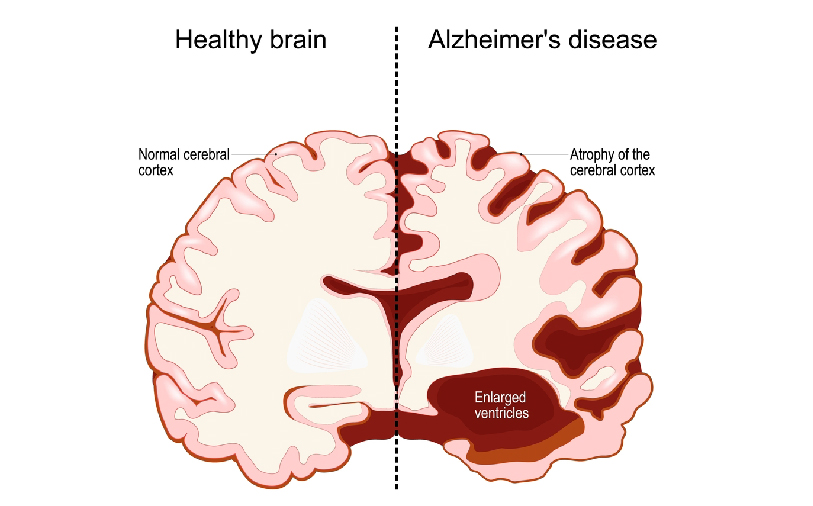Dementia is the umbrella term for the conditions characterised by cognitive, functional and behavioral decline. All forms of dementia, including Alzheimer's disease, have an impact on speech, behaviour, and memory. Alzheimer's disease is the most prevalent kind of dementia that becomes worse over time, but dementia is a broad word for these symptoms.
Alzheimer's disease and dementia can strike younger people, but your risk rises with advancing age. Even though persons over 65 are more likely to have dementia or Alzheimer's disease, neither condition is considered as a normal aspect of aging.
Although the symptoms of many forms of dementia are similar, it might be helpful to differentiate Alzheimer's disease symptoms from those of other dementias in order to determine treatment and disease's prognosis.
Understanding the two terminologies and how they differ can help people with Alzheimer's or another dementia, their families, and carers by arming them with the knowledge they need.
Also Read: लकवा क्या है? जानिए इसके कारण, लक्षण और इलाज के तरीके

An array of symptoms linked to a decline in memory, reasoning, or other cognitive abilities is referred to as dementia. Dementia can be caused by a wide range of illnesses. Mixed dementia is a condition that is characterised by brain changes and symptoms associated with more than one type of dementia occurring simultaneously. Between 60 to 80 percent of dementia cases are caused by Alzheimer's disease, making it the most prevalent cause of dementia. Although advancing age increases the risk of dementia, aging with dementia is not normal. It is brought on by any type of damage to brain cells that impairs communication, which can have an impact on emotions, behaviour, and thought processes.
Alzheimer's is a degenerative brain disorder brought on by intricate alterations in the brain activity after the specific cell damage in the brain tissue. It causes symptoms of dementia that progressively get worse over time. Because Alzheimer's usually affects the area of the brain linked to learning first, therefore difficulty in remembering new information is the most prevalent early symptom of the condition. The signs of Alzheimer's disease worsen with time and include behavioural abnormalities, confusion, and disorientation. Walking, swallowing, and speaking eventually become challenging.
Also Read: Best Paralysis Treatment In Bangalore
Following are the most common symptoms of Alzheimer's disease:
Following are the most common symptoms of dementia:
Dementia and Alzheimer's disease are two different but related terms. Here, the difference between Alzheimer's and dementia:
| Aspect | Dementia | Alzheimer’s Disease |
| Definition | A general term for cognitive decline affecting memory, reasoning, and daily functioning. | A specific brain disease and the most common cause of dementia. |
| Cause | Can result from various conditions like Alzheimer’s, vascular damage, or Parkinson’s. | Caused by abnormal buildup of amyloid plaques and tau tangles in the brain. |
| Symptoms | Memory loss, confusion, difficulty with problem-solving, mood changes, or motor issues. | Progressive memory loss, language problems, disorientation, and difficulty in reasoning. |
| Progression | Depends on the underlying cause; progression rates vary. | Gradual and predictable decline in cognitive and physical abilities. |
Hyderabad is home to advanced rehab centers offering specialized care for Alzheimer’s and dementia patients. These centers provide cognitive therapy, memory care programs, and emotional support tailored to individual needs. Multidisciplinary teams of neurologists, therapists, and caregivers ensure holistic and compassionate care. State-of-the-art facilities promote patient well-being and quality of life.
In conclusion, Alzheimer's disease is a particular kind of dementia marked by gradual memory loss and cognitive decline, whereas dementia is a general term that encompasses a variety of symptoms affecting cognitive ability. There are various forms of dementia, each with unique causes and associated symptoms.
It may become challenging to communicate with a loved one who has dementia. However, don't discuss them or topics they could find interesting without mentioning them. Additionally, avoid asking them if they recall someone or something, interrupting them, or speaking angrily.
If you think you or your loved ones are dealing with symptoms of Alzheimer's disease or dementia, then reach out to our experts at Walk Again, the best rehab centre in Hyderabad. Book your appointment now!
Q1: Are the treatments for Alzheimer’s and dementia the same?
A: Treatments overlap but vary depending on the underlying cause of dementia. Alzheimer’s-specific medications like donepezil are used when applicable.
Q2: Can lifestyle changes help prevent Alzheimer’s or dementia?
A: Healthy habits like regular exercise, a balanced diet, mental stimulation, and managing conditions like diabetes or hypertension can lower the risk of cognitive decline.
Q3: Can dementia symptoms be reversed?
A: Some reversible causes of dementia, like vitamin deficiencies or medication side effects, can improve with treatment, but Alzheimer’s is not reversible.